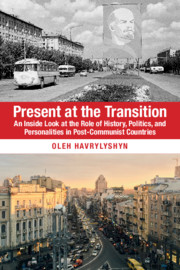 Present at the Transition
Present at the Transition Book contents
- Present at the Transition
- Present at the Transition
- Copyright page
- Dedication
- Contents
- Figures
- Tables
- Preface
- Acknowledgments
- Abbreviations
- Introduction
- Part I The Diverse Paths Taken in Transition
- Part II Choice of Strategy
- 3 Historical Legacies
- 4 Reform Commitment of Political Leaders and Populations
- 5 The Role of Technocrats
- 6 External Incentives and Pressures
- Part III Domestic Vested Interests and Reforms
- Part IV Outcomes and Prospects
- Bibliography
- Index
3 - Historical Legacies
Hysteresis versus Critical Juncture
from Part II - Choice of Strategy
Published online by Cambridge University Press: 04 May 2020
- Present at the Transition
- Present at the Transition
- Copyright page
- Dedication
- Contents
- Figures
- Tables
- Preface
- Acknowledgments
- Abbreviations
- Introduction
- Part I The Diverse Paths Taken in Transition
- Part II Choice of Strategy
- 3 Historical Legacies
- 4 Reform Commitment of Political Leaders and Populations
- 5 The Role of Technocrats
- 6 External Incentives and Pressures
- Part III Domestic Vested Interests and Reforms
- Part IV Outcomes and Prospects
- Bibliography
- Index
Summary
Four major forces played a role in determining whether a country moved rapidly in the transformation: historical legacy; reform commitment by leaders; the role of specialist technocrats; and external influences. This chapter addresses the historical legacies that affected the strategy and speed of transition, be they inertia or return to earlier history. While in general being closer to Western Europe and today’s European Union, or having a shorter history of communism tended to propel countries toward more rapid reforms, there were many exceptions on both sides of the divide. Thus, Bulgaria, Serbia, and Romania initially moved far more slowly. Farther east, Russia, Kyrgyzstan, and to some extent Armenia initially moved far faster on economic reforms that others in the USSR – although this was effort was soon aborted. The chapter also asks how related historical issues affected economic reform speed: the occurrence of wars or civil conflicts (Yugoslav republics, Armenia and Azerbaijan, and Tajikistan); and the role of nationalism – sometimes positive (the Baltics and Ukraine), sometimes negative (Armenia and Azerbaijan, Georgia, and Moldova).
- Type
- Chapter
- Information
- Present at the TransitionAn Inside Look at the Role of History, Politics, and Personalities in Post-Communist Countries, pp. 65 - 82Publisher: Cambridge University PressPrint publication year: 2020


